| Listing 1 - 9 of 9 |
Sort by
|
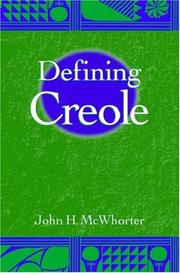
ISBN: 0195166698 9780195166699 0195166701 9780195166705 0198044410 1280534028 1423720768 0195347234 1433700859 9781423720768 9781433700859 9781280534027 9786610534029 6610534020 9780195347234 9780198044413 0197721494 0190290404 Year: 2005 Publisher: Oxford Oxford university press
Abstract | Keywords | Export | Availability | Bookmark
 Loading...
Loading...Choose an application
- Reference Manager
- EndNote
- RefWorks (Direct export to RefWorks)
Collecting recent work by John H. McWhorter on creole languages & their origins, this volume showcases many of his novel & controversial theories, including the claim that the differences between creoles & their source languages is much more than a matter of inflection.
Creolan languages --- Dialectology --- Creole dialects --- Linguistic change --- Grammar --- Lexicology --- Inflection --- Linguistic change. --- Grammar. --- Inflection. --- Lexicology. --- Change, Linguistic --- Language change --- Historical linguistics --- Language and languages --- Creole languages --- Creolized languages --- Languages, Mixed --- Pidgin languages --- Creole dialects - Grammar --- Creole dialects - Lexicology --- Creole dialects - Inflection
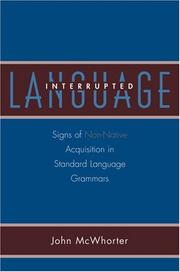
ISBN: 9780195309805 0195309804 0199788375 1435619722 0198042310 128116349X 9786611163495 Year: 2007 Publisher: Oxford Oxford University Press
Abstract | Keywords | Export | Availability | Bookmark
 Loading...
Loading...Choose an application
- Reference Manager
- EndNote
- RefWorks (Direct export to RefWorks)
Grammar --- Sociolinguistics --- Languages in contact --- Linguistic change --- Typology (Linguistics) --- Grammar, Comparative and general --- Language and languages --- Linguistic typology --- Linguistics --- Linguistic universals --- Change, Linguistic --- Language change --- Historical linguistics --- Areal linguistics --- Typology --- Classification
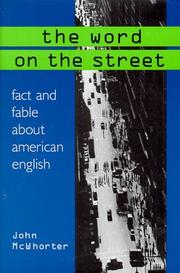
ISBN: 0306459949 Year: 1998 Publisher: New York London Plenum Trade
Abstract | Keywords | Export | Availability | Bookmark
 Loading...
Loading...Choose an application
- Reference Manager
- EndNote
- RefWorks (Direct export to RefWorks)
Americanismen --- Americanisms --- Américanismes --- Anglais des noirs --- Black English --- Ebonics --- Negerengels --- English language --- Social aspects --- United States --- Spoken English --- Variation --- Language and culture --- African Americans --- Language
Multi
ISBN: 9781108553308 1108553303 9781108428644 1108428649 9781108450836 1108450830 1108601936 1108618561 Year: 2018 Publisher: Cambridge, UK Cambridge University Press
Abstract | Keywords | Export | Availability | Bookmark
 Loading...
Loading...Choose an application
- Reference Manager
- EndNote
- RefWorks (Direct export to RefWorks)
Creoles have long been the subject of debate in linguistics, with many conflicting views, both on how they are formed, and on what their political and linguistic status should be. Indeed, over the past twenty years, some creole specialists have argued that it has been wrong to think of creoles as anything but language blends in the same way that Yiddish is a blend of German and Hebrew and Slavic. Here, John H. McWhorter debunks the idea that creoles are created in the same way as "children," taking characteristics from both "parent" languages, and its underlying assumption that all historical and biological processes are the same. Instead, the facts support the original, and more interesting, argument that creoles are their own unique entity and are among the world's only genuinely new languages.
Creole dialects. --- Languages in contact. --- Creole dialects --- Languages in contact --- Creole languages --- Creolized languages --- Creolan languages --- Sociolinguistics --- Areal linguistics --- Languages, Mixed --- Pidgin languages
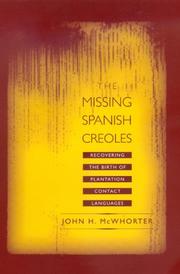
ISBN: 0520923499 1597347566 9780520923492 0585391661 9780585391663 0520219996 9780520219991 9781597347563 Year: 2000 Publisher: Berkeley : University of California Press,
Abstract | Keywords | Export | Availability | Bookmark
 Loading...
Loading...Choose an application
- Reference Manager
- EndNote
- RefWorks (Direct export to RefWorks)
John McWhorter challenges an enduring paradigm among linguists in this provocative exploration of the origins of plantation creoles. Using a wealth of data--linguistic, sociolinguistic, historical--he proposes that the ""limited access model"" of creole genesis is seriously flawed.
Creole dialects --- Pidgin languages --- Blacks --- Negroes --- Ethnology --- Contact vernaculars --- Hybrid languages --- Jargons --- Pidgeon languages --- Pigeon languages --- Lingua francas --- Languages, Mixed --- Creole languages --- Creolized languages --- History. --- Languages. --- Black persons --- Black people --- Languages --- History
Book
ISBN: 9780190468897 Year: 2016 Publisher: New York Oxford University Press
Abstract | Keywords | Export | Availability | Bookmark
 Loading...
Loading...Choose an application
- Reference Manager
- EndNote
- RefWorks (Direct export to RefWorks)
"Japanese has a term that covers both green and blue. Russian has separate terms for dark and light blue. Does this mean that Russians perceive these colors differently from Japanese people? Does language control and limit the way we think, such that each language gives its speakers a different 'worldview?' This opinionated book addresses the Sapir-Whorf hypothesis, which argues that the language we speak shapes the way we perceive the world. Linguist John McWhorter argues that while this idea is mesmerizing, it is plainly wrong ... McWhorter shows not only how the idea of language as a lens fails but also why we want so badly to believe it: we're eager to celebrate diversity by acknowledging the intelligence of peoples who may not think like we do. Though well-intentioned, our belief in this idea poses an obstacle to a better understanding of human nature and even trivializes the people we seek to celebrate. The reality--that all humans think alike--provides another, better way for us to acknowledge the intelligence of all peoples."--Jacket.
Book
ISBN: 9783110276435 9783110278262 311027826X 3110276437 9781283856867 1283856867 Year: 2012 Volume: 56 Publisher: Berlin Boston De Gruyter Mounton
Abstract | Keywords | Export | Availability | Bookmark
 Loading...
Loading...Choose an application
- Reference Manager
- EndNote
- RefWorks (Direct export to RefWorks)
Saramaccan has been central to various debates regarding the origin and nature of creole languages. Being the most removed of all English-based creoles from European language structure in terms of phonology, morphology and syntax, it has been seen as one of the most extreme instantiations of the creolization process. This is the first full-length description of Saramaccan. The grammar documents, in particular, a valence-sensitive system of indicating movement and direction via serial verb constructions, hitherto overlooked amidst the generalized phenomenon of serialization itself.
Creolan languages --- Grammar --- Suriname --- Saramaccan language --- Creole dialects --- Creole languages --- Creolized languages --- Languages, Mixed --- Pidgin languages --- Creole dialects, English --- Saramaccan language. --- Creole dialects. --- Creole Language. --- Grammar. --- Language Change. --- Language Contact. --- Saramaccan.
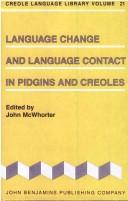
ISBN: 1282163620 9786612163623 902729948X 9789027299482 1556196687 9027252432 Year: 2000 Publisher: Amsterdam ; Philadelphia : J. Benjamins,
Abstract | Keywords | Export | Availability | Bookmark
 Loading...
Loading...Choose an application
- Reference Manager
- EndNote
- RefWorks (Direct export to RefWorks)
This book collects a selection of fifteen papers presented at three meetings of the Society for Pidgin and Creole Linguistics in 1996 and 1997. The focus is on papers which approach issues in creole studies with novel perspectives, address understudied pidgin and creole varieties, or compellingly argue for controversial positions.
LANGUAGE ARTS & DISCIPLINES --- Linguistics / General --- Pidgin languages --- Creole dialects --- Languages in contact --- Linguistic change --- Creole languages --- Creolized languages --- Languages, Mixed --- Contact vernaculars --- Hybrid languages --- Jargons --- Pidgeon languages --- Pigeon languages --- Lingua francas --- Historical linguistics --- Language and languages
Book
ISBN: 9788484899624 8484899624 9783954874972 3954874970 3954878941 Year: 2016 Publisher: Frankfurt : Vervuert,
Abstract | Keywords | Export | Availability | Bookmark
 Loading...
Loading...Choose an application
- Reference Manager
- EndNote
- RefWorks (Direct export to RefWorks)
Creole languages lexified by Spanish and Portuguese have played a relatively small role in theories of creole genesis. This volume argues that there is not a priori reason to give English and French-based plantation creoles a preferential treatment, but shows that Iberian-based creoles demonstrate a diversity of complex circumstances that any overarching theory of creole genesis ought to take into account.
Creole dialects, Spanish --- Creole dialects, Portuguese --- Creole dialects --- Congresses --- History. --- Congresses. --- Spanish Creole languages --- Creole languages --- Creolized languages --- Languages, Mixed --- Pidgin languages --- Portuguese Creole languages --- History
| Listing 1 - 9 of 9 |
Sort by
|

 Search
Search Feedback
Feedback About UniCat
About UniCat  Help
Help News
News